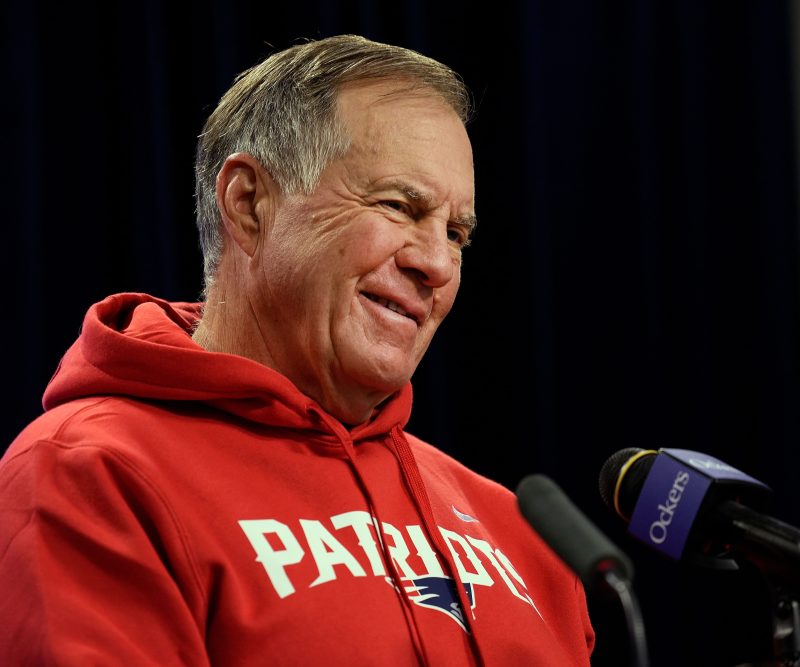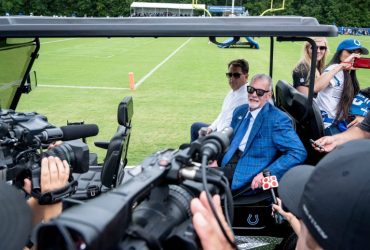Bill Belichick won’t be a better media member than he was an NFL coach. There’s a chance he can come close, though, and that says only good things about Belichick’s performance on “The Pat McAfee Show Draft Spectacular’ that streamed on ESPN platforms on Thursday night during the first round of the 2024 NFL draft.
The six-time Super Bowl champion head coach excelling in an on-air capacity — one of the greatest talent evaluators ever (the last few years excluded) talking about player evaluation — shouldn’t surprise anybody. What is worth marveling at, however, is how natural Belichick looked and sounded behind the desk.
Over four hours, Belichick offered perspective only someone who has his history of winning could. He also offered a glimpse of what is to come Mondays this fall when he regularly appears on McAfee’s daily afternoon show. His “television” (this alt-cast was for streaming only) mechanics were more than solid. He flexed his producing muscles and leveraged his connections to score timely guests, such as Washington Commanders general manager Adam Peters, New Orleans Saints head coach Sean Payton and Minnesota Vikings head coach Kevin O’Connell — representatives from three of the six organizations that took quarterbacks on Thursday, all with ties to the “GOAT.”
Any fears that Belichick, who was tight-lipped as the head coach of the New England Patriots, would be reticent in front of the cameras can be forgotten. He wasn’t windy, but Belichick wasn’t shy, either. Perhaps it was the relaxed nature of McAfee’s show — cursing allowed, bits encouraged — that allowed Belichick to feel at ease and calmly deliver his points. Seated between the host, McAfee, and contributor Darius Butler, Belichick laughed along with the outbursts and antics from his fellow panelists. He interjected without interrupting and laid out when McAfee and his crew dialed up the bro levels. Belichick’s points were nearly always clear and concise.
The start of the stream was not ideal, as viewers on YouTube had no audio feed and watched McAfee and Belichick move around their version of a draft big board in silence.
NFL DRAFT HUB: Latest NFL Draft mock drafts, news, live picks, grades and analysis.
Once the mics were working, Belichick was rolling. He began by offering his take on the difference between being in the draft room of a team with a top-three pick compared to one in the top 10 with an eye toward moving up. Before Caleb Williams went first overall to the Chicago Bears, the show played up the Peyton Manning against Tom Brady rivalry, in which Belichick was a central figure, by comparing top picks like Williams to those greats. Going deep on the quarterbacks early was wise, albeit expected, since six of the first 12 picks were signal-callers.
“It’s the consistency over and over again that makes them the championship quarterbacks in this league,” Belichick said.
Asked if all six were franchise quarterbacks, Belichick gave a detailed answer and then gave a clear edict: “if you draft those guys early, you got to play ‘em.”
After the Minnesota Vikings took J.J. McCarthy 10th overall, Belichick made his positive feelings toward the Michigan product known.
“He just makes good decisions,” Belichick said in the most effusive way possible.
He then offered thoughts on when to insert a young quarterback into the starting lineup — even if it went against how he ultimately handled Mac Jones in his final seasons in New England.
“If you put him in early, you don’t want to take him out Week 4 or Week 5,” Belichick said. “What you don’t want to do is you’re in and you’re out, you’re in and you’re out. There might be a couple of tough spots in there, but you stay with him.”
Belichick traded 95 times during his 23 years of running drafts for the Patriots, and McAfee and Co. discussed his love of trading back. Belichick said that “you have to find a trade partner” and explained the reality of what decision-makers face in the draft room.
As the picks rolled in, Belichick briefly consulted the selected player’s tape in an alliterative segment called “Bill Belichick’s Big Breakdown.” He communicated clearly with producers to freeze certain frames, and what could have been an awkward exchange — such an interaction is rare in live TV — instead was smooth and enhanced the analysis. Belichick offered how he would defend new Washington Commanders quarterback Jayden Daniels, taken second overall; the defensive whiz said he would have a spy on the reigning Heisman Trophy winner to make sure Daniels didn’t beat him running or on throws outside the numbers.
When the Patriots picked quarterback Drake Maye at No. 3, he might have hesitated a millisecond before his reaction and added an extra “um” while explaining that the selection met one of three obvious needs on the roster (quarterback, wide receiver, offensive tackle). He also pushed back on Maye’s self-comparison of Buffalo Bills quarterback Josh Allen.
“We’ll see about that. I think there are some similarities in size and athleticism,” Belichick said. “But Josh Allen is pretty special.”
Deprived of talking about defensive players until the 15th overall pick when the Indianapolis Colts took Laiatu Latu, Belichick unleashed a thought I’d never heard on a draft broadcast before — it’s hard to block in domes like the ones in Detroit, Minnesota or Indianapolis, and drafting players who can rush the passer are that much more valuable for those organizations.
Belichick didn’t shy away from asking a question to Peters, who worked in the New England front office more than a decade ago, about potentially moving back into the first round.
“Hard-hitting questions from you, Bill,” Peters replied, “I didn’t know I was getting that from you.”
There was the Belichick dry humor he occasionally unveiled while coaching. He described a running lane opened up by offensive lineman JC Latham, the Tennessee Titans’ pick at No. 7, by saying “even I could make a couple of yards through there.”
Belichick offered history lessons throughout the show, from talking about the late-90s drafts of the Patriots and the Pittsburgh Steelers’ 1974 draft that produced four Hall of Famers to Carl Banks, a former linebacker for the New York Giants. He told an anecdote of arguing with Bill Parcells about the proper personnel to tackle former Detroit Lions running back Barry Sanders.
“Nobody was harder (to tackle) than you,” Belichick told Sanders, who joined the show in-person during the last hour.
O’Connell, who played for Belichick as a backup quarterback, told his former coach “you know how much you mean to me” during a more poignant moment of the stream. One of the more prescient moments came prior to Denver’s selection of Bo Nix at No. 12; Belichick encouraged the Broncos to trade back because he felt that Nix, if he was indeed Denver’s man, would be available later. Denver took Nix at 12 anyway.
Belichick wasn’t perfect. Nobody can be perfect on a live stream that lasts four hours. He called Iowa cornerback Cooper DeJean “Cooper De-John” and struggled with the pronunciation of “Latu.” He had to quickly correct himself once when he said “Atlanta” instead of “Alabama.” Even the most seasoned draft announcers have a slip-up or two per year.
Whether it was his appearances with NFL Films, the passionate press conference answers about special teams or his introspective documentary “The Two Bills,” Belichick has always shown the more amenable side of his personality to the camera — in addition to his football genius — when he wants to. On Thursday, he reminded us that if being the greatest coach to ever live wasn’t enough, he could be one of the game’s best analysts.





